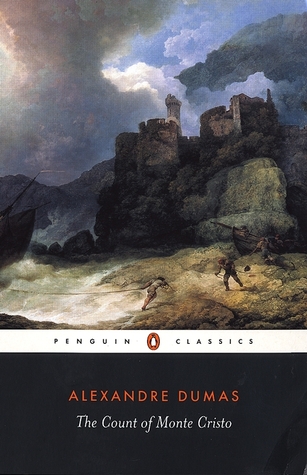Review: Alexandre Dumas’s “The Count of Monte Cristo”
by Miles Raymer
I don’t know what state the revenge narrative was in before The Count of Monte Cristo hit the scene, but this book remains a paragon of the genre nearly two centuries after publication. Alexandre Dumas’s classic is deeply concerned with the character of human happiness and suffering, and challenges readers to cherish what good fortune we have, knowing it might be stolen from us at any moment. It is also something of a bloated mess; at 1200+ pages, this is the first unabridged classic to make me consider the possibility that abridgment might be a good idea in some cases.
The first fifth of The Count of Monte Cristo is riveting and heartbreaking. Aided by Dumas’s adroit prose and Robin Buss’s able translation, we watch virtuous young Edmond Dantès’s life fall apart at the whims of jealous and ambitious rivals. Nudged along by one or two particularly bad turns of fate, Dantès finds himself unjustly imprisoned, and vows to take revenge on those responsible for his suffering, and to reward those who tried to intervene on his behalf.
Over time, Dantès forges a connection with a fellow inmate, who not only teaches him how to behave like a cosmopolitan European gentleman, but also provides a path toward unimaginable wealth. Fourteen years after his confinement, Dantès finally escapes his bonds, and sets out to keep his vow. Upon claiming his treasure, Dantés takes on the persona of The Count of Monte Cristo, morphing into an enigmatic angel of vengeance: “Farewell, goodness, humanity, gratitude…Farewell all those feelings that nourish and illuminate the heart…let the avenging God make way for me to punish the wrongdoer!” (loc. 7275).
And then everything slows down…way down. It turns out The Count has a good head for strategy, and he begins setting up a vast network of social and financial circumstances that will, in the end, take down his enemies with crushing elegance. The problem is that oftentimes the reader has to cover three or four hundred pages before he/she gets an inkling of why certain events are significant to the greater plot. The story loses its fevered grit and becomes nauseatingly aristocratic. Worse still, The Count’s magnetic presence falters as he vanishes from center stage for significant chunks of text.
This is no doubt a symptom of the book’s original publication as an eighteen-part serial––a process not known to encourage restraint or brevity. Although the overall plot is remarkably intricate, thematically resonant, and ultimately satisfactory, I lost my way more than a few times in the labyrinth of cultural asides, fashion critiques, financial machinations, and overblown dialogue that characterized Dumas’s literary moment. If the core of Dumas’s narrative has survived as one of our fictional treasures, the same cannot be said of its suffocating trappings.
Happily, Dumas ends with an appropriate bang, reining in the many plot threads around and gracefully tying up loose ends. Most rewarding is The Count’s realization that while the proper application of justice is sweet indeed, the path of vengeance cannot be traversed without trampling some innocents along the way. When events get out of hand, The Count’s conscience forces him to depose himself as righteous avenger and regain his humanity: “Monte Cristo paled at this terrible spectacle. He realized that he had exceeded the limits of vengeance…that he could no longer say: ‘God is for me and with me'” (loc. 27300).
We find that, for all his super-human suffering and well-earned splendor, The Count is still just a man trying to square himself to the sad reality of his past and the uncertain nature of his emotional future. His maturation is a delight to behold:
Look at the past, look at the present, try to divine the future and consider whether I am not the instrument of the Lord. The most frightful misfortunes, the most cruel suffering, the abandonment of all those who loved me and persecution by those who did not know me: this was the first part of my life. Then, suddenly, after captivity, solitude and misery, air, freedom and a fortune so brilliant, so imposing and so extravagant that, unless I was blind, I must have thought that God had sent it to me for some great purpose. From then on, that fortune seemed to me a holy vocation; from then on, there was not one further thought in me…I felt myself driven like a cloud of flame through the sky to destroy the cities of the plain. Like those adventurous captains who set off on some dangerous expedition, I got together my supplies, I loaded my weapons and I gathered the means of attack and defence, making my body used to the most violent exercise and my soul to the roughest shocks, teaching my arm to kill, my eyes to see suffering and my mouth to smile at the most dreadful spectacles. Kind, trustful and forgiving as I was, I made myself vengeful, secretive and cruel––or, rather, impassive like fate itself, which is deaf and blind. Then I launched myself down the road that I had opened, plunging forward until I reached my goal. Woe betide whomsoever I met on my path! (loc. 27538)
Slogging through this door-stopper was worth it for passages like that one. The Count’s story––Edmond’s story––teaches us that revenge rends the human heart as much as it mollifies our longing for retribution. Even in the face of great wrongdoing, balancing the scales of justice is not an unambiguous moral task.
Rating: 7/10
